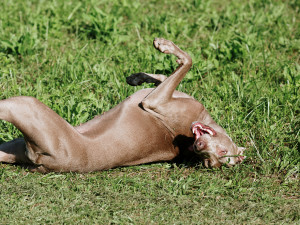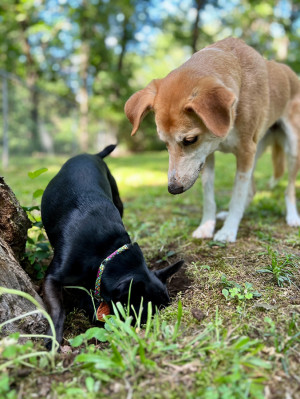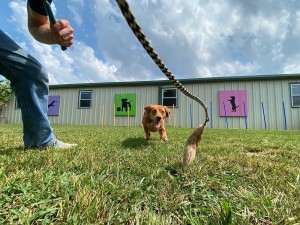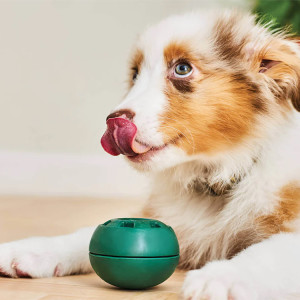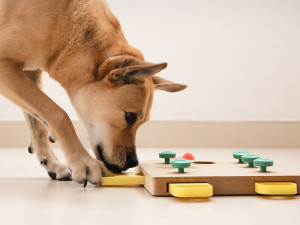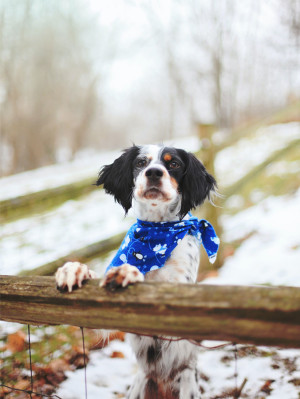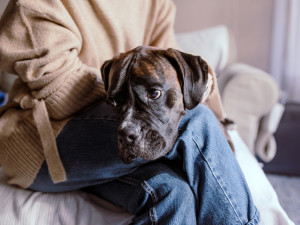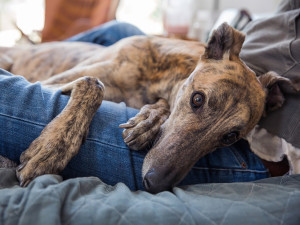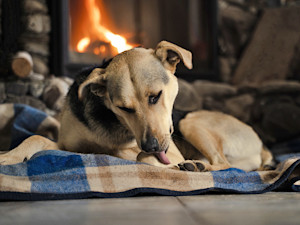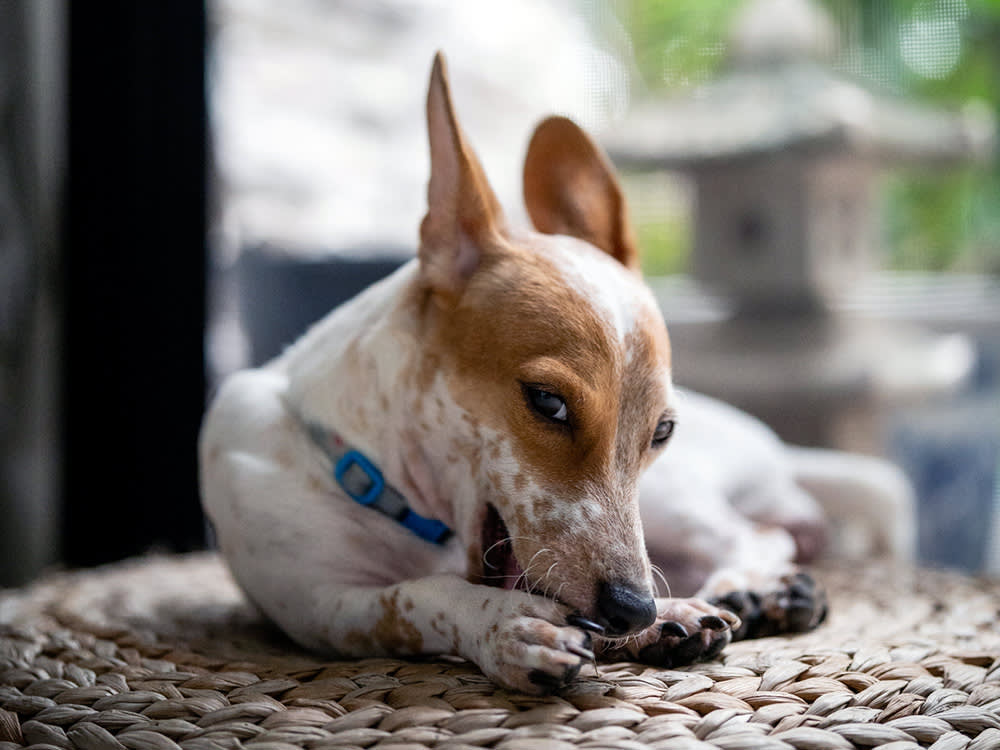
Share Article
In This Article:
Common Reasons Dogs Chew Their Paws How to Stop Paw Chewing When to See Your Vet About Paw Chewing How Will a Vet Treat Paw Chewing?
You’re sitting on the couch, cuddling with your dog, when you notice they just start going to town on their paws, chewing like there’s a lost treat in there or something. Next time, you notice it when you’re both trying to settle in for bed. The paw-chomping continues — what could be causing it?
Dogs chew their paws for various reasons, including cleaning, boredom, anxiety, allergies, injuries, parasites, and foreign objects. Excessive paw chewing can lead to irritation, infection, and behavioral problems. If your dog is chewing their paws excessively, it’s important to identify the underlying cause and seek veterinary attention if necessary.
Common reasons why dogs chew their paws
Pododermatitis is inflammation of the paw’s skin, including the nail beds, paw pads, and space between the toes. It can affect one or more feet and is a common reason for dogs to lick their paws. Pododermatitis is a set of symptoms rather than a specific diagnosis, so action is often needed to determine the cause of the inflammation. Not all causes of paw chewing in dogs require immediate attention, but don’t ignore persistent biting and licking of the paws.

Reasons for dogs to chew their paws include:
Cleaning/grooming
While dogs don’t indulge in hour-long tongue baths like cats, they still use licking as a means to keep themselves clean. Licking can be used to remove outdoor debris from their paws.
Behavioral issues
Anxiety and boredom in dogs can manifest in a few ways, including panting, pacing, destructive behavior, and excessive grooming. While some dogs may pacify themselves by licking their paws, this repetitive action can result in hair loss and skin irritation.
Allergies
Dogs can be allergic to fleas, food, or elements of their environment. No matter the cause, allergic dogs often have itchy feet. Constant licking and chewing can be an early indicator to dog parents that their pup has allergies.
Infection
Bacterial and fungal infections are common causes for dogs to lick their paws. Yeast and bacteria often thrive in damp environments, including damp doggie feet. Continuous chewing can create small breaks in the skin, providing entry points for infection. Infection also causes irritation that encourages licking and chewing, creating a cycle where additional dampness encourages more bacteria and yeast to grow.
Injuries
Dog paws commonly sustain trauma from cuts, broken toenails, hot surfaces, or contact with irritants like cleaning products or rock salt. Penetrating injuries can result in irritating foreign bodies under the skin (think of an annoying splinter in your finger). Pups often lick painful areas as a way to self-soothe.
Parasites
Hookworm larvae can use a dog’s feet as a point of entry, burrowing under the skin and entering the lymphatic system. Skin parasites, such as fleas, ticks, and mites can also cause itchiness and inflammation that will make some dogs bite their paws constantly.
How can I encourage my dog to stop chewing their paw?
Dog parents just want their pups to be happy and healthy, but non-stop gnawing and smacking can be pretty annoying, especially during the night. When excessively biting paws, dogs should be evaluated by a veterinarian to rule out health issues first.
Make sure it isn’t a medical issue: Consult with your veterinarian to rule out trauma, infections, or parasitic infestations that can be remedied with medical treatment.
Identify triggers: Dogs may be allergic to certain proteins in their food. Doing a food trial may help to identify which proteins your dog should avoid.
Behavioral modifications: Addressing issues with anxiety and boredom may involve boosting mental stimulation and ensuring adequate exercise. After ruling out medical issues, dog parents can test if paw chewing diminishes after incorporating more physical activity, toys, or food puzzles. Some dogs may need anti-anxiety medication or a consultation with a veterinary behaviorist.
Environmental modifications: Swampy paws become irritated paws if they are not dried properly. Dogs who spend a lot of time in water or moist environments may need a break or to have their parents ensure that their paws are thoroughly dried after getting wet. Keeping dogs out of areas with heavy brush and sharp plant material may help prevent injury.
Protective measures: Elizabethan collars (cone collars) are often used to break the cycle of constant licking and chewing. Using a physical barrier can help curb the behavior and give paws a chance to heal.
When should I take my dog to the vet for chewing their paw?
Some dog parents seek veterinary help for their dog’s paw chewing because they “just want to get some freaking sleep.” And that’s valid. Other reasons to seek treatment for a dog or puppy chewing their paw include:
Pain
Swelling
Excessive redness
Wounds/scabs
Hair loss
Odor
Compulsive behavior
How will a vet treat my dog for excessive paw chewing?
Treatment for a dog chewing their paws depends on the cause. Your veterinarian will start with a medical history and a thorough physical exam to look for signs of trauma, infection, or infestation. They may recommend diagnostic testing, such as skin scraping or impression smears, to rule out bacteria, yeast, or skin mites. If there is concern for trauma to the bone, radiographs (X-rays) may be warranted. Your vet may also prescribe medications for infections and infestations. Traumatic injuries may require procedures like draining an abscess, repairing a wound, or placing a bandage.
If there is concern for a chronic issue, such as allergies or behavioral problems, then treatment can be less straightforward. Food trials and elimination diets may be recommended for suspected allergies. Behavior modification may include a combination of environmental change, training, and medication.
FAQs (People also ask):
Is boredom a common cause of paw chewing in dogs?
Boredom and anxiety can be reasons that dogs constantly lick and chew their paws. To try to curb this behavior, dog parents can increase mental stimulation with toys and ensure their dog is getting adequate exercise.
Should I use a cone or protective covering to prevent paw chewing?
Cone collars can be used to break the cycle of constant licking and give injured or infected dog paws an opportunity to stay dry and heal. While physical barriers are helpful, they’re not considered a permanent solution.
Is it bad for my dog if they constantly chew or lick their paw?
Occasionally, licking or chewing the paws is a normal part of dog grooming and behavior. When the chewing and licking becomes compulsive or causes trauma, consult a vet.
References:
Canine Pododermatitisopens in new tab

Dr. Alycia Washington, DVM, MS
Alycia Washington is a small-animal emergency veterinarian with over 10 years of experience based in North Carolina. She works as a relief veterinarianopens in new tab and provides services to numerous emergency and specialty hospitals. She also works as a veterinary writer with a focus on educating pet parents.
Related articles
![Dog looking for treats in an interactive dog puzzle toy]()
17 Best Interactive Dog Puzzle Toys
Let the games begin.
![dog using diy paw wax to protect paws in snow standing next to fence]()
Cold Weather Is the Nemesis of Dog Paws. Here’s How to Help
We all have to up our moisturizing game in the fall and winter.
![Sad boxer rests on owners lap, dog doesn't want to be touched]()
How to Tell if Your Dog Is in Pain
And what to do to help them.
![Close-up of a Merle coated Greyhound dog laying in the lap of their pet parent on the bed]()
How to Give Relief to Your Dog With a Chronic Condition
What are the best ways to manage a dog’s pain?
![Xoloitzcuintli dog wearing coat in the snow.]()
The Best Winter Boots for Dogs in 2026
Here’s why you might want to protect those toe beans.
![Dog licking its paw inside by the fire.]()
Hot Spots in Dogs: What Are They, How to Treat Them, and How They Compare to Ringworm
From home treatments to holistic methods—and when to call a vet.
